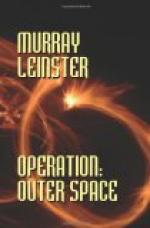There was nothing to do. Cochrane could only watch and listen helplessly while the strong beast-smell rose to his nostrils, and the innumerable noises of unseen uneasy creatures sounded in his ears.
Inside the ship Alicia wept hopelessly. Babs tried in vain to comfort her.
CHAPTER TEN
The sun rose. Cochrane noted the time, it was fourteen hours since sunset. The local day would be something more than an Earth-day in length. The manner of sunrise was familiar. There was a pale gray light in the sky. It strengthened. Then reddish colors appeared, and changed to gold, and the unnamed stars winked out one after another. Presently the nearer hillsides ceased to be black. There was light everywhere.
Alicia, white and haggard, waited to see what the light would show.
But there was heavy mist everywhere. The hill-crests were clear, and the edge of the visible woodland, and the top half of the ship’s shining hull rose clear of curiously-tinted, slowly writhing fog. But everything else seemed submerged in a sea of milk.
But the mist grew thinner as the sun shone on it. Its top writhed to nothingness. All this was wholly commonplace. Even clouds in the sky were of types well-known enough. Which was, when one thought about it, inevitable. This was a Sol-type sun, of the same kind and color as the star which warmed the planet Earth. It had planets, like the sun of men’s home world. There was a law—Bode’s Law—which specified that planets must float in orbits bearing such-and-such relationships to each other. There must also be a law that planets in those orbits must bear such-and-such relationships of size to each other. There must be a law that winds must blow under ordinary conditions, and clouds form at appointed heights and times. It would be very remarkable if Earth were an exception to natural laws that other worlds obey.
So the strangeness of the morning to those who watched from the ship was more like the strangeness of an alien land on Earth than that of a wholly alien planet.
The lower dawnmist thinned. Gazing down, Cochrane saw dark masses moving slowly past the ship’s three metal landing-fins. They were the beasts of the night, moving deliberately from their bed-ground to the vast plains inland. There were bunches of hundreds, and bunches of scores. There were occasional knots of dozens only.
From overhead and through the mist Cochrane could not see individual animals too clearly, but they were heavy beasts and clumsy ones. They moved sluggishly. Their numbers dwindled. He saw groups of no more than four or five. He saw single animals trudging patiently away.
He saw no more at all.
Then the sunlight touched the inland hills. The last of the morning mist dissolved, and there were the dead bodies of two beasts near the base of the ship. Johnny Simms had killed them with his first panicky shots of the night. There was another dead beast a quarter-mile away.




